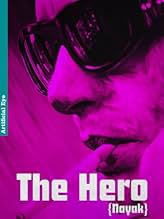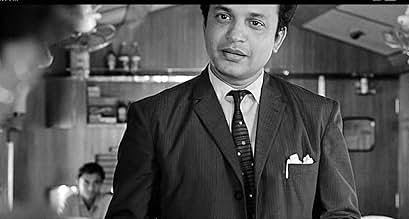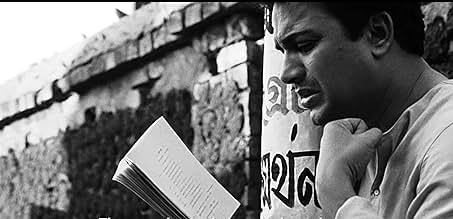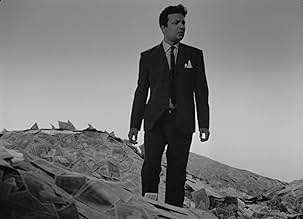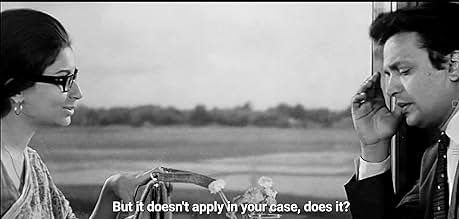VALUTAZIONE IMDb
8,3/10
5643
LA TUA VALUTAZIONE
Aggiungi una trama nella tua linguaEn route to Delhi to receive an award, a Bengali film star reevaluates his success through his fellow passengers, dreams, and past experiences.En route to Delhi to receive an award, a Bengali film star reevaluates his success through his fellow passengers, dreams, and past experiences.En route to Delhi to receive an award, a Bengali film star reevaluates his success through his fellow passengers, dreams, and past experiences.
- Premi
- 8 vittorie e 1 candidatura in totale
Kamu Mukherjee
- Pritish Sarkar
- (as Kamu Mukhopadhyay)
Susmita Mukherjee
- Molly (Mr. Sarkar's wife)
- (as Susmita Mukhopadhyay)
Subrata Sensharma
- Ajoy
- (as Subrata Sen)
Jogesh Chatterjee
- Aghore, elderly journalist
- (as Jogesh Chattopadhyay)
Satya Banerjee
- Swamiji
- (as Satya Bandyopadhyay)
Recensioni in evidenza
I was around 14 years old when I first saw this masterpiece of Satayajit Ray. One very common thing between Ray and Kurosawa I noticed was introspection of perception.
A train journey allows a superstar to introspect his life and career which leaves him in shattered pieces. Uttam Kumar as Arindam was simply unbelievable and so was Shartmila Tagore as the reporter who was acting as a mirror (much needed) for Arindam to reflect.
This movie will give everyone a glimpse of the price paid to succeed. Success here is the Devil and greed here is the devil's advocate.... the price..........."SOUL"
A must watch if you are a movie lover....My Vote - 9/10
A train journey allows a superstar to introspect his life and career which leaves him in shattered pieces. Uttam Kumar as Arindam was simply unbelievable and so was Shartmila Tagore as the reporter who was acting as a mirror (much needed) for Arindam to reflect.
This movie will give everyone a glimpse of the price paid to succeed. Success here is the Devil and greed here is the devil's advocate.... the price..........."SOUL"
A must watch if you are a movie lover....My Vote - 9/10
This film from director Satyajit Ray reminded me a little bit of Ingmar Bergman's 'Wild Strawberries', as in each case a protagonist takes a trip in order to receive a big award, and thinks back on his life with some regrets. In this case, it's not an elderly professor, it's a middle-aged movie star (Uttam Kumar), and instead of a car ride with a daughter-in-law, it's a train trip where he meets a young journalist (Sharmila Tagore). She serves as his conscience and mirror over a series of discussions the pair have, and what she reflects is often not very pretty.
At the film's outset the famous star seems to have it all with his success and good looks, and Kumar looks pretty damn cool in shades and when he blows smoke rings. It's soon apparent that he's so worried about someday losing his fame that he's lost bits of his humanity along the way. Via flashbacks we find that he's done some petty things to others, abandoned the altruistic cause of a friend, and taken advantage of women who want to get into films. There is something empty and pathetic about his life that those who get to know him see, including the journalist and a mother and daughter in his compartment who are adoring fans, but see how he pops sleeping pills and gets plastered. And yet, he's always cast as a hero (a 'nayak'), and to the legions of fans who crowd around him in the train stations, he is one.
The meaning of that is pretty clear, but it's not as simple as just showing us how someone on a pedestal may be unworthy of being there. More generally, the film shows us how the most outwardly successful people may be damaged or flawed within, and carry a lot of insecurity. It does this in a thoughtful and reflective way, avoiding simple black/white characterizations. Ray adds depth to the story with a subplot in which a salesman wants his wife to be friendly to another man in order to help win him over. It adds to the overall question, to what lengths should one go in order to be (financially) successful? And regardless of whether one can stay on top, he reminds us via a powerful dream sequence featuring skeletal arms poking up out of mounds of cash, that death will come for us all.
The performances are all fantastic, including an old curmudgeon who eschews "modern movies", and Tagore, who is intelligent, sassy in a reserved way, and beautiful too. I liked how Ray didn't have her succumb to the movie star's charms, as a weaker director/writer might have done. He also uses the train very well, both in moving the action around its various compartments and aisles, and in giving us the scenery outside. In one moment Kumar stares down at the adjacent rail track streaming by with a glint of light on it, and it made me wonder if he was wishing he could be like that rail, staying straight as the train of life rumbled along, and always in the light. The film also made me wonder if the main character reflected a little of Ray himself, who by this time was famous (ala Fellini's 8 ½). It's a film that I might rate higher with a second viewing, and may have held back a little here because I have a slight aversion to stories involving the problems of famous people. It was memorable and had a strong ending.
At the film's outset the famous star seems to have it all with his success and good looks, and Kumar looks pretty damn cool in shades and when he blows smoke rings. It's soon apparent that he's so worried about someday losing his fame that he's lost bits of his humanity along the way. Via flashbacks we find that he's done some petty things to others, abandoned the altruistic cause of a friend, and taken advantage of women who want to get into films. There is something empty and pathetic about his life that those who get to know him see, including the journalist and a mother and daughter in his compartment who are adoring fans, but see how he pops sleeping pills and gets plastered. And yet, he's always cast as a hero (a 'nayak'), and to the legions of fans who crowd around him in the train stations, he is one.
The meaning of that is pretty clear, but it's not as simple as just showing us how someone on a pedestal may be unworthy of being there. More generally, the film shows us how the most outwardly successful people may be damaged or flawed within, and carry a lot of insecurity. It does this in a thoughtful and reflective way, avoiding simple black/white characterizations. Ray adds depth to the story with a subplot in which a salesman wants his wife to be friendly to another man in order to help win him over. It adds to the overall question, to what lengths should one go in order to be (financially) successful? And regardless of whether one can stay on top, he reminds us via a powerful dream sequence featuring skeletal arms poking up out of mounds of cash, that death will come for us all.
The performances are all fantastic, including an old curmudgeon who eschews "modern movies", and Tagore, who is intelligent, sassy in a reserved way, and beautiful too. I liked how Ray didn't have her succumb to the movie star's charms, as a weaker director/writer might have done. He also uses the train very well, both in moving the action around its various compartments and aisles, and in giving us the scenery outside. In one moment Kumar stares down at the adjacent rail track streaming by with a glint of light on it, and it made me wonder if he was wishing he could be like that rail, staying straight as the train of life rumbled along, and always in the light. The film also made me wonder if the main character reflected a little of Ray himself, who by this time was famous (ala Fellini's 8 ½). It's a film that I might rate higher with a second viewing, and may have held back a little here because I have a slight aversion to stories involving the problems of famous people. It was memorable and had a strong ending.
'Awesome....' There should be simply one word, which makes it clear. But can't resist myself from being elaborate!!! People say one have lots of shades in his/her character, fewer said - 'If one's a public figure, then you are the most neglected character in the society'. Readers may feel confused. Don't be. Just feel the misery & anger of one who's popular and common people want to know everything about him. There is no so called private thing he can have. This burnt him so much and the aftermath is: he tends to hide his all things from everyone. This process got his entire effort and the work for which he is famous tends to loose focus. In the way to keep secrets, often the person himself forgot those very own & inner things.
Here, train journey implies the must have life long journey as a human being. Often these persons open up their very inner most feelings-thoughts-memories to someone. But only when he/she is assured of something: 'Again the secrecy of these things'.
In Nayak, Sharmila plays that kind of character who can keep secrets like a secret, but only with healthy warmth personal touch. This movie was framed in late 60's, but the thought process behind it, eternal. There are endless thing to describe this movie. You have to watch it, because it's journey of a lifetime for everyone. It was nominated for many international awards, as Ray & Uttam Kumar both gave their best possible effort here. 9 out of 10.
Here, train journey implies the must have life long journey as a human being. Often these persons open up their very inner most feelings-thoughts-memories to someone. But only when he/she is assured of something: 'Again the secrecy of these things'.
In Nayak, Sharmila plays that kind of character who can keep secrets like a secret, but only with healthy warmth personal touch. This movie was framed in late 60's, but the thought process behind it, eternal. There are endless thing to describe this movie. You have to watch it, because it's journey of a lifetime for everyone. It was nominated for many international awards, as Ray & Uttam Kumar both gave their best possible effort here. 9 out of 10.
Satyajit Ray's Nayak tells the story of a film star. Of course, in mainstream Indian cinema, leading men are known as heroes, and the interesting paradox about the star of this film (which is probably true of most film stars who enjoy great public adulation) is that beneath this fake façade of stardom, fans, and fame, lies a man with a truly wounded soul, someone who has seemingly accomplished everything in his career but has actually accomplished nothing of what he would have probably wished for, both a person and and as an artiste. A very interesting concept of course which is adapted onto the screen in a most authentic and engaging picture. The film might not be Ray's best film, but it's still Ray's film after all, so how can one even expect anything less than that.
Satyajit Ray is, needless to say (sometimes even embarrassing to have to say that), a master director, a master storyteller, and this film is no exception in the illustrious list of evidence to his talent. Nayak is meaningful, highly absorbing, and to me it's a visual treat. The camera work and lighting are spectacular for a black-and-white film, and the setting of most of the story within a train makes for a delightful watch not only visually but culturally. Culturally because the decorative elegance, the restaurant, the order, as well as the crowd of passengers, wouldn't normally be associated with Indian trains of that period and might raise several eyebrows among non-Indians. The moving train demonstrates breathtaking views as the script moves through its conversational episodes.
Nayak works as a story, as a film, but in many ways as a poem, full of hidden, thought-provoking messages, and as a psychology textbook full of interesting insights of the human soul. The film also provides the viewer with a glimpse into the world of filmmaking from the actors' standpoint. While the story of a film hero who is actually nothing of the sort in real life is actually not big news to anyone nor is it a terribly original idea for a film, Ray makes it into such a personal story that the lead character's being an actor becomes just a random plot element. Ray takes us into his troubled world and does so with extraordinary symbolism. Take the dream sequences just as an example of Ray's profound mastery.
Naturalistic acting is to be expected in Ray films. Uttam Kumar is excellent in this author-backed role. Very few films of that era, not only in India, allowed this much of character depth and complexity, in fear of confusing the moviegoing public, but Ray knew how to balance it well, and Kumar plays the mix of Arindam's stylish appearance and inner conflict exceedingly well. Sharmila Tagore is luminous as the young, morally upright and compassionate journalist who learns to see the person behind the star and the story behind the item. She is grace personified with her elegant demeanor and restrained delivery. These two make this film what it is, and their interactions give the film its intellectual weight. The conclusion of the story is more than optimistic thanks to Ray's keen, optimistic vision.
Satyajit Ray is, needless to say (sometimes even embarrassing to have to say that), a master director, a master storyteller, and this film is no exception in the illustrious list of evidence to his talent. Nayak is meaningful, highly absorbing, and to me it's a visual treat. The camera work and lighting are spectacular for a black-and-white film, and the setting of most of the story within a train makes for a delightful watch not only visually but culturally. Culturally because the decorative elegance, the restaurant, the order, as well as the crowd of passengers, wouldn't normally be associated with Indian trains of that period and might raise several eyebrows among non-Indians. The moving train demonstrates breathtaking views as the script moves through its conversational episodes.
Nayak works as a story, as a film, but in many ways as a poem, full of hidden, thought-provoking messages, and as a psychology textbook full of interesting insights of the human soul. The film also provides the viewer with a glimpse into the world of filmmaking from the actors' standpoint. While the story of a film hero who is actually nothing of the sort in real life is actually not big news to anyone nor is it a terribly original idea for a film, Ray makes it into such a personal story that the lead character's being an actor becomes just a random plot element. Ray takes us into his troubled world and does so with extraordinary symbolism. Take the dream sequences just as an example of Ray's profound mastery.
Naturalistic acting is to be expected in Ray films. Uttam Kumar is excellent in this author-backed role. Very few films of that era, not only in India, allowed this much of character depth and complexity, in fear of confusing the moviegoing public, but Ray knew how to balance it well, and Kumar plays the mix of Arindam's stylish appearance and inner conflict exceedingly well. Sharmila Tagore is luminous as the young, morally upright and compassionate journalist who learns to see the person behind the star and the story behind the item. She is grace personified with her elegant demeanor and restrained delivery. These two make this film what it is, and their interactions give the film its intellectual weight. The conclusion of the story is more than optimistic thanks to Ray's keen, optimistic vision.
10sbaindia
A movie at par with Citizen Kane and Rashomon and IMO even better than them in some ways. Impeccable direction and superb acting. Makes you wonder why these two - the actor and director not get together more often in Satyajit Roy films. The angst was so real it seems the guy is not acting any more - just telling his story as it is. The dream sequencewas outstanding as was the ending. The characterisation had on occasion skirted around the burlesque with the older actor in his first interaction with the protagonist but that made the scene all the more poignant. The underlying philosophy is not too deep but something that one can deeply empathise with. The greatness of this movie is how perfectly the story is told. There is an aura of dramatic tension throughout, not between the characters but within the protagonist himself. I would sincerely recommend this movie to anyone who loves what cinema is all about.
Lo sapevi?
- QuizDirector Satyajit Ray had written the script of this movie considering only Uttam Kumar in the lead role. He had confessed that if Uttam Kumar had refused it, he would've abandoned the project altogether.
- Citazioni
Arindam Mukherjee: There's no scope of overacting in front of camera; if you overact a little, then it will magnify tenfold in the camera.
- ConnessioniReferenced in Autograph (2010)
I più visti
Accedi per valutare e creare un elenco di titoli salvati per ottenere consigli personalizzati
- How long is The Hero?Powered by Alexa
Dettagli
- Tempo di esecuzione1 ora 57 minuti
- Colore
- Mix di suoni
- Proporzioni
- 1.37 : 1
Contribuisci a questa pagina
Suggerisci una modifica o aggiungi i contenuti mancanti


